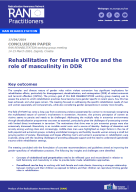Details
- Publication date
- 31 July 2024
- Author
- Directorate-General for Migration and Home Affairs
- Country
- Croatia
- RAN Publications Topic
- Gender/women
- Rehabilitation
Description
The complex and diverse nature of gender roles within violent extremism has significant implications for rehabilitation efforts, particularly for disengagement, deradicalisation, and reintegration (DDR) of violent extremist and terrorist offenders (VETOs). The primary goal of this RAN REHABILITATION working group meeting was to assess the extent to which rehabilitation practices have become more gender-specific in recent years, how this has been achieved, and what gaps remain. The meeting focused on addressing the specific rehabilitation needs of men and women separately and comparatively, while also considering gender perspectives in society more broadly.
The field of P/CVE has come a long way from exoticising violence perpetrated by women to increasingly recognising the multifaceted nature of women's involvement in extremism. However, the primary perception of women as victims seems to persist and needs to be challenged. Addressing the multiple roles in extremist environments through deradicalisation programmes was seen as essential, particularly given the challenges of prosecuting women with limited direct involvement in terrorism. The motivations that drive men to join extremist groups were also extensively discussed. Masculinity is an invisible social norm and a source of identity. Feelings of alienation and anxiety among working-class and, increasingly, middle-class men were highlighted as major factors in the rise of both populist and extremist groups, including uninhibited misogyny and hostility towards women among a small but growing section of society. Stereotypes and biases affecting men’s and women’s experiences in rehabilitation were explored, along with the resulting challenges of providing adequate support and the need to understand (gendered) trauma within rehabilitation settings.
The meeting concluded with the formulation of concrete recommendations and guidelines aimed at improving the gender-specificity of rehabilitation practices. The following key insights and challenges were identified:
- Concepts of victimhood and perpetration need to be reflected upon and reconsidered in relation to both femininity and masculinity in order to provide tailor-made rehabilitation approaches.
- Parenthood can be key to working with both female and male clients. Assuming a stronger relationship between mothers and their children as opposed to fathers and their children can reproduce limiting gender roles in rehabilitation.
- A better understanding of the different forms of masculinity available for appropriation helps narrow down the elements that are harmful both to individuals and society.
- Addressing emotions, particularly anger, in rehabilitation programmes is crucial, as it is often a secondary emotion that signals deeper issues.

